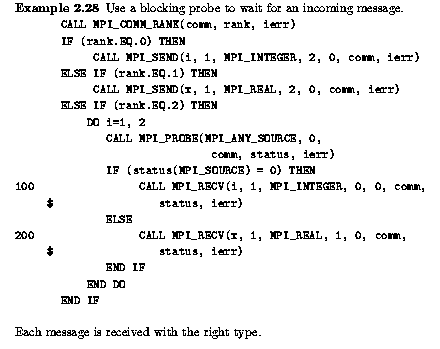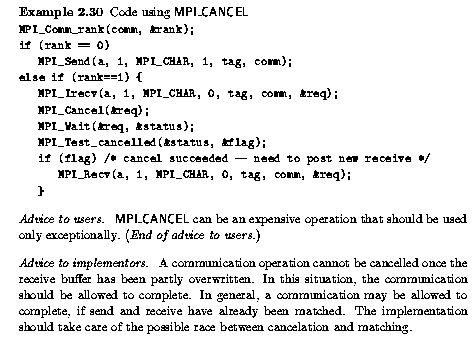
MPI_PROBE and MPI_IPROBE allow polling of incoming messages without actually receiving them. The application can then decide how to receive them, based on the information returned by the probe (in a status variable). For example, the application might allocate memory for the receive buffer according to the length of the probed message.
MPI_CANCEL allows pending communications to be canceled. This is required for cleanup in some situations. Suppose an application has posted nonblocking sends or receives and then determines that these operations will not complete. Posting a send or a receive ties up application resources (send or receive buffers), and a cancel allows these resources to be freed.
MPI_IPROBE(source, tag, comm, flag, status) IN source rank of source IN tag message tag IN comm communicator OUT flag true if there is a message OUT status status objectMPI_Iprobe(int source, int tag, MPI_Comm comm, int *flag, MPI_Status *status)
MPI_IPROBE(SOURCE, TAG, COMM, FLAG, STATUS, IERROR)LOGICAL FLAG
INTEGER SOURCE, TAG, COMM, STATUS(MPI_STATUS_SIZE), IERROR
MPI_IPROBE is a nonblocking operation that returns flag = true if there is a message that can be received and that matches the message envelope specified by source, tag, and comm. The call matches the same message that would have been received by a call to MPI_RECV (with these arguments) executed at the same point in the program, and returns in status the same value. Otherwise, the call returns flag = false, and leaves status undefined. MPI_IPROBE has local completion semantics.
If MPI_IPROBE(source, tag, comm, flag, status) returns flag = true, then the first, subsequent receive executed with the communicator comm, and with the source and tag returned in status, will receive the message that was matched by the probe.
The argument source can be MPI_ANY_SOURCE, and tag can be MPI_ANY_SOURCE MPI_ANY_TAG, so that one can probe for messages from an arbitrary MPI_ANY_TAG source and/or with an arbitrary tag. However, a specific communicator must be provided in comm.
It is not necessary to receive a message immediately after it has been probed for, and the same message may be probed for several times before it is received.
MPI_PROBE(source, tag, comm, status) IN source rank of source IN tag message tag IN comm communicator OUT status status objectMPI_Probe(int source, int tag, MPI_Comm comm, MPI_Status *status)
MPI_PROBE(SOURCE, TAG, COMM, STATUS, IERROR)INTEGER SOURCE, TAG, COMM, STATUS(MPI_STATUS_SIZE), IERROR
MPI_PROBE behaves like MPI_IPROBE except that it blocks and returns only after a matching message has been found. MPI_PROBE has non-local completion semantics.
The semantics of MPI_PROBE and MPI_IPROBE guarantee progress, in the same way as a corresponding receive executed at the same point in the program. progress, for probe If a call to MPI_PROBE has been issued by a process, and a send that matches the probe has been initiated by some process, then the call to MPI_PROBE will return, unless the message is received by another, concurrent receive operation, irrespective of other activities in the system. Similarly, if a process busy waits with MPI_IPROBE and a matching message has been issued, then the call to MPI_IPROBE will eventually return flag = true unless the message is received by another concurrent receive operation, irrespective of other activities in the system.


MPI_CANCEL(request) IN request request handleMPI_Cancel(MPI_Request *request)
MPI_CANCEL(REQUEST, IERROR)INTEGER REQUEST, IERROR
MPI_CANCEL marks for cancelation a pending,
cancelation
nonblocking communication operation (send or receive). MPI_CANCEL
has local completion semantics.
It returns immediately, possibly before the
communication is actually canceled.
After this, it is still necessary to complete a
communication that has been marked
for cancelation, using a call to MPI_REQUEST_FREE,
MPI_WAIT, MPI_TEST or one of the functions in
Section ![]() . If the communication was not cancelled
(that is, if the communication happened to start before the
cancelation could take effect), then
the completion call will complete the communication, as
usual. If the communication was
successfully cancelled,
then the completion call will deallocate the request object
and will return in status the information that the
communication was canceled.
The application should then call MPI_TEST_CANCELLED,
using status as input, to test
whether the communication was actually canceled.
. If the communication was not cancelled
(that is, if the communication happened to start before the
cancelation could take effect), then
the completion call will complete the communication, as
usual. If the communication was
successfully cancelled,
then the completion call will deallocate the request object
and will return in status the information that the
communication was canceled.
The application should then call MPI_TEST_CANCELLED,
using status as input, to test
whether the communication was actually canceled.
Either the cancelation succeeds, and no communication occurs, or the communication completes, and the cancelation fails. If a send is marked for cancelation, then it must be the case that either the send completes normally, and the message sent is received at the destination process, or that the send is successfully canceled, and no part of the message is received at the destination. If a receive is marked for cancelation, then it must be the case that either the receive completes normally, or that the receive is successfully canceled, and no part of the receive buffer is altered.
If a communication is marked for cancelation, then a completion call for that communication is guaranteed to return, irrespective of the activities of other processes. In this case, MPI_WAIT behaves as a local function. Similarly, if MPI_TEST is repeatedly called in a busy wait loop for a canceled communication, then MPI_TEST will eventually succeed.
MPI_TEST_CANCELLED(status, flag) IN status status object OUT flag true if canceled
MPI_Test_cancelled(MPI_Status *status, int *flag)
MPI_TEST_CANCELLED(STATUS, FLAG, IERROR)LOGICAL FLAG
INTEGER STATUS(MPI_STATUS_SIZE), IERROR
MPI_TEST_CANCELLED is used to test whether the communication operation was actually canceled by MPI_CANCEL. It returns flag = true if the communication associated with the status object was canceled successfully. In this case, all other fields of status are undefined. It returns flag = false, otherwise.
